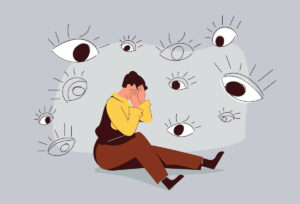Do you have a fear of spiders? What about needles? Or public speaking? If so, you are not alone. Millions of people around the world suffer from phobias. Phobias can be incredibly debilitating and can keep people from living their lives to the fullest. But what is a phobia, exactly? And more importantly, how can it be treated? In this blog post, we will discuss cognitive behavioral therapy for phobias. We will explore what cbt is, and how it can help people overcome their fears!
Contents
What Are Phobias?
Phobias are intense, irrational fears of particular objects or situations. They can be so overwhelming that a person may go to great lengths to avoid encountering the object or situation they fear. People with phobias often experience physical symptoms, such as dizziness, rapid heart rate, and difficulty breathing when faced with their fear.
Common phobias include fear of flying, heights, spiders, snakes, needles, and public speaking. It is estimated that up to 10% of the population has a phobia of some sort. Phobias can affect people of any age. However, they are more common in children and adolescents.
Most phobias develop during childhood or adolescence and can stay with a person throughout their life. In severe cases, phobias can interfere with daily activities and even relationships. It is important to remember that although phobias are intense, irrational fears, they are treatable.
How Does CBT Work For Phobias?
CBT is used to treat phobias by helping the patient confront their fear in a safe and controlled environment. The main goal of CBT for phobias is to gradually reduce the fear that the patient experiences when exposed to the object or situation they are afraid of. This can be done through exposure therapy, which involves exposing the person to the source of their fear in small, manageable doses.
As the patient becomes more comfortable with the situation, they can increase the exposure and eventually overcome their fear. Additionally, CBT helps patients learn coping skills such as deep breathing, relaxation techniques, and positive thinking that can help them manage their fears in real-life situations.
CBT for phobias is an effective treatment because it helps the patient to become more aware of their thoughts and feelings about the fear. As well as how they can better manage those fears. With support and guidance from a mental health professional, individuals can learn to gain mastery over their anxiety and live a fulfilling life free from fear.
What Is An Example Of CBT For Phobia?
 Cognitive-behavioral therapy (CBT) is a type of psychotherapy that can help individuals overcome fear, phobias, and other irrational thoughts. CBT is based on the idea that our thoughts, feelings, and behaviors are all interconnected and influence each other. By changing certain patterns of thinking and behavior, we can better manage our emotions and our reactions to certain situations.
Cognitive-behavioral therapy (CBT) is a type of psychotherapy that can help individuals overcome fear, phobias, and other irrational thoughts. CBT is based on the idea that our thoughts, feelings, and behaviors are all interconnected and influence each other. By changing certain patterns of thinking and behavior, we can better manage our emotions and our reactions to certain situations.
For example, someone with a fear of flying may benefit from CBT for phobia by learning specific techniques. As a person with a fear of flying confronts the anxiety associated with their phobia, they can be taught to use deep breathing and relaxation techniques. Along with these physical responses, individuals may also be encouraged to challenge their negative thoughts about flying and create more positive ones.
This can help reduce the intensity of the anxious feelings associated with the phobia. Additionally, individuals can work on gradually exposing themselves to their fear by taking small steps and building up their confidence as they go. Over time, CBT for phobia can help the individual become desensitized to the fear and ultimately reduce or eliminate it altogether.
How Many Sessions Of CBT For Phobia?
Generally, cognitive-behavioral therapy (CBT) for phobia requires between 8 to 20 sessions. The duration of each session can last anywhere from 45 minutes to an hour and a half, depending on the individual’s needs. Some people may benefit more from fewer sessions while others could require more frequent or longer sessions.
Ultimately, the amount of CBT sessions needed to effectively treat a phobia can vary significantly from person to person. Also depending on the severity and complexity of the particular phobia. If a person has more than one phobia, additional sessions may be required in order to adequately address each fear and its associated behaviors.
What Are The Benefits Of CBT For Phobias?
 If you experience a phobia, it can be incredibly debilitating to your everyday life. You may often feel overwhelmed or find yourself avoiding situations that bring on fear. Thankfully, Cognitive Behavioral Therapy (CBT) is an effective treatment option for reducing the intensity of your phobias and helping you cope with their effects.
If you experience a phobia, it can be incredibly debilitating to your everyday life. You may often feel overwhelmed or find yourself avoiding situations that bring on fear. Thankfully, Cognitive Behavioral Therapy (CBT) is an effective treatment option for reducing the intensity of your phobias and helping you cope with their effects.
The following are some of the benefits of CBT for phobias:
1. Builds self-confidence: By working with a therapist, you can learn concrete skills to help manage your fear. And gradually challenge yourself in situations that may have previously felt overwhelming or unmanageable. This process of facing fears helps to build self-confidence as you practice and become more comfortable with facing your fears.
2. Helps you develop skills to address irrational thinking: CBT helps to identify and challenge the negative beliefs and thoughts that may be contributing to your fear or phobia. As well as replace them with more balanced and realistic ones. By gradually changing these thought patterns, you can work towards overcoming your fear or phobia.
3. Focuses on the present: Unlike other therapeutic modalities, CBT does not focus on past events or traumas that may have contributed to the formation of a phobia. Rather, it focuses on working with you in the present moment to help reduce and manage your symptoms. This allows you to build skills and strategies specifically for managing your phobia in the present.
4. A safe and non-invasive approach: CBT is a safe approach that does not involve any medications or invasive procedures. It is an evidence-based, time-limited therapy that encourages taking small steps toward overcoming your fear or phobia.
CBT can be incredibly effective in helping to reduce the intensity and impact of a phobia on your life. If you are struggling with a fear or phobia, consider speaking with a therapist who is trained in CBT to get started on your journey toward freedom from fear.
When Is CBT Not Appropriate?
Usually, CBT is the preferred method of intervention for mental health problems. But there are certain situations when it may not be the best option. For instance, if a person is suffering from a severe psychological disorder such as psychosis or bipolar disorder. Then more intensive, longer-term treatments may be necessary.
Additionally, CBT cannot always provide a complete solution to some mental health problems. For example, it may not be effective for treating personality disorders or some types of severe depression. In such cases, medication and other forms of therapy may be more appropriate.
Finally, a person’s attitude towards CBT can also determine its effectiveness as a treatment. If they are unwilling to commit to the work involved in therapy, then it may not be successful.
CBT is a helpful therapy for many, but it’s important to understand when it may or may not be the right choice. Working with a mental health professional can help you decide if CBT is the best option for your particular situation.
What Is The Success Rate Of CBT For Phobia?
 The success rate of CBT for phobia is very encouraging. Studies have shown that CBT is a highly effective short-term treatment for specific phobias, with up to 90% of patients having improvement in their fear or avoidance after completing treatment. Additionally, the results tend to be sustained over time, with the majority of patients maintaining their gains up to a year after treatment.
The success rate of CBT for phobia is very encouraging. Studies have shown that CBT is a highly effective short-term treatment for specific phobias, with up to 90% of patients having improvement in their fear or avoidance after completing treatment. Additionally, the results tend to be sustained over time, with the majority of patients maintaining their gains up to a year after treatment.
When it comes to more complex and longstanding phobias such as agoraphobia or social anxiety disorder. Then, CBT is also highly effective but usually takes longer to have an impact. Research suggests that around 75% of people with these disorders will show a significant reduction in anxiety symptoms after completing CBT. Furthermore, some studies have found that these gains tend to be maintained at follow-up points up to one year later.
Overall, there is substantial evidence that CBT is an effective form of treatment for different types of phobia. This form of therapy can help people to manage their fear and reduce the intensity of their symptoms over a reasonably short period of time. However, it is important to remember that everyone’s experience will be unique, so results may vary.
Conclusion
To conclude, CBT for phobias are effective in helping people to overcome their fear and anxiety. The treatment is tailored to the individual’s needs and owns unique circumstances, which makes it an ideal solution for those suffering from phobias. In addition, CBT can be used in conjunction with other therapies to ensure the best possible outcome.
If you have a phobia or know someone who does, don’t hesitate to reach out for help. With the right treatment plan, you can learn how to manage and eventually overcome your fear. CBT is one of the most popular and effective treatments available for phobias today.
For more information, please contact MantraCare. A phobia is a serious behavior that can cause physical, emotional, or psychological harm to a person. If you have any queries regarding Online Counseling experienced therapists at MantraCare can help: Book a trial Online therapy session


